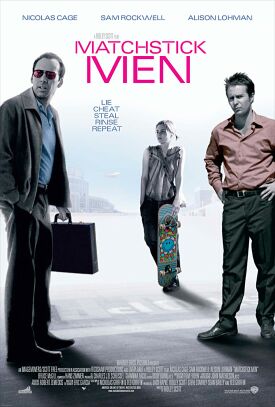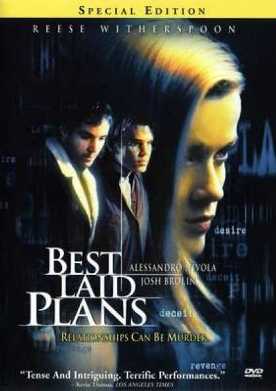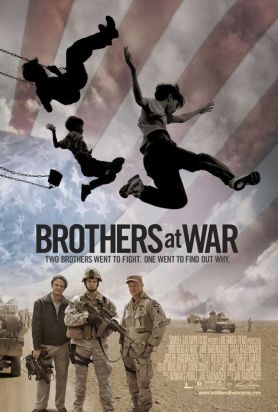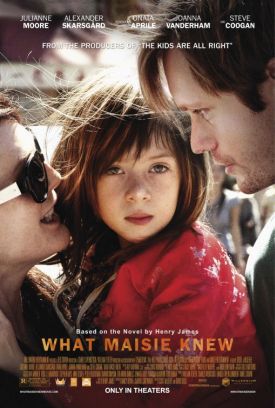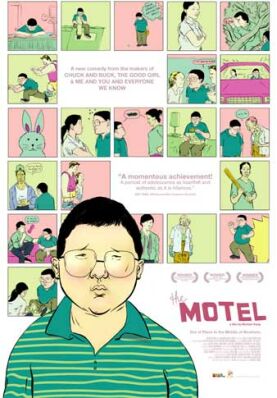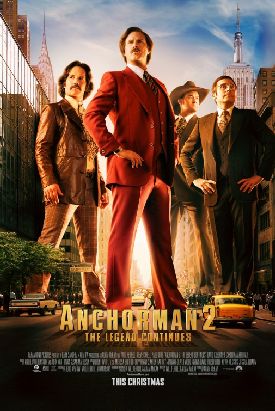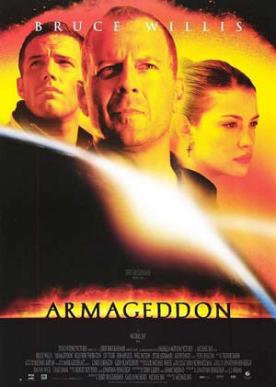Matchstick Men
The best thing about Matchstick Men, directed by Ridley Scott and adapted by Nicholas and Ted Griffin from novel by Eric Garcia, is the plot. Unfortunately, I can tell you very little about the plot without giving away a vital piece of information that viewers will rightly consider essential to be withheld until just the right moment in the film itself if their enjoyment of it is to be complete. Suffice it to say that Roy Waller (Nicholas Cage), despite suffering from obsessive-compulsive disorder, is making a good living as a confidence man in partnership with Frank Mercer (Sam Rockwell) when into his life there suddenly comes a daughter, Angela (Alison Lohman), that he never knew he had.
The effect on Roy is immediate. For the first time in years he begins to break out of his carefully-established routines, and he even begins to think about living a more normal family life, unburdened by the conscience that troubles him from time to time in his present line of work. But as is so often the case with criminals contemplating retirement, at least in the movies, Roy first wants to make one last score — more for the younger and still hungry Frank than for himself — by pretending to be a crooked bank official engaged in some kind of currency trading that allows him to skim free money off the top of the books.
Just how he is supposedly able to do this without detection and why, apart from sheer gullibility, the mark, Chuck Frechette (Bruce McGill), should believe him eager to cut him in on the profits are questions that Mr Scott apparently thinks it unimportant to answer. But Chuck’s apparent willingness to be fleeced, however suspicious in itself, does at least tend to bear out Roy’s insistence that he is not a thief, not a con-man, but a con-artist, because he does not take people’s money. They offer it to him of their own free will. “They give me their money out of greed or weakness, and I have never used violence,” he tells his doctor (Bruce Altman), who has helped him re-establish contact with Angela.
Is this just a story he tells himself or is there a real moral distinction there? Can we allow ourselves to sympathize with such a man — especially when, to his surprise, Angela volunteers to help with the effort to deceive poor Chuck? Whatever we may think of his exotic criminal career or its sophistical justification, it is hard to resist the appeal of the pride felt by this lonely man in the idea that this beautiful, charming child may be a chip off the old block. The obsessive-compulsive disorder is also meant to underline the extent to which Roy lives in his own world, and the film draws on our natural sympathy with somebody coming out of such a shell.
But when you think about it, someone who makes his living by exploiting the trust of others might be well advised to stay inside his shell — might find, in fact, that he can hardly exist any other way. The first rule of being a con-artist that he teaches to Angela is to make sure that the person you’re conning isn’t conning you. Thus Roy’s gradual emergence back into the world, his learning to overrule his obsessive neatness and tolerate the messiness of a typical teenage girl not only becomes a metaphor for his rejoining the human race but also signifies a new and worrying vulnerability.
That’s one problem. The fact that the human race is otherwise pretty much unrepresented in the movie is another. It creates the odd impression that Roy’s decision to get a regular job and become an honest man and a husband and a father are all ideas thought up by him for the first time. But as the rest of the world is apparently still made up of nothing but criminals and dupes, Roy’s carving out a little piece of the filth and building on it an honest and straightforward heaven of goodness for himself and his family is perhaps treated with less celebration than it deserves.
Instead, innocence and goodness only puts in a perfunctory appearance at the very end, as if Mr Scott were ashamed of needing some such gesture in order to make his portrayal of this morally ugly world less jarring and more in keeping with the cuteness of its family situation. Like Chicago, his film hardly bothers to disguise its underlying cynicism. Though Mr Cage, always a hard-working actor, twitches and grunts and stammers his little heart out, he is never quite able to erase the impression that the movie itself is heartless.
Discover more from James Bowman
Subscribe to get the latest posts to your email.

